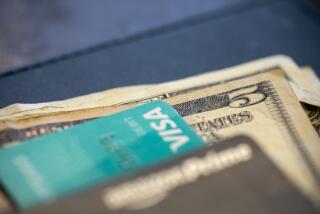No Shortcuts on Road Back From Bankruptcy
- Share via
Sally D. was earning upward of $30,000 a year, but she had never been able to get ahead. At the end of each month she just barely made her rent, credit card and car payments. She never had money left over for savings, she says. Still, she was getting by--until she lost her job.
Later, forced into low-paying, temporary work, Sally saw her financial life disintegrating. Finally, last year, she filed for bankruptcy.
Sally was far from alone. Thanks in part to corporate downsizings and the nationwide recession, personal bankruptcy filings have been hitting new highs. This year, bankruptcy experts expect consumer bankruptcies to number more than 1 million for the first time.
Now, Sally says, she is on the road to financial recovery. But it’s not easy. Indeed, recovering one’s credit after a bankruptcy is one of the most difficult of all financial tasks.
The scar of bankruptcy can stay on your credit record for as long as 10 years. That makes day-to-day living more difficult and, sometimes, more costly. Moreover, those who do not address the root causes of the bankruptcy may end up bankrupt again, experts say.
Many of the people who go bankrupt are living on a financial precipice, and just one upset--such as losing a job or getting a major medical bill--throws them over the edge, says John Ventura, a Brownsville, Tex.-based bankruptcy attorney. The trick is to repair your ailing credit record and revamp your spending patterns at the same time. That way you won’t blow your second chance when you are able to borrow again.
How do you do it?
The first step is to request a copy of your credit report from all the major credit bureaus. This is pivotal because there is a very good chance the credit report is inaccurate if your debts have been discharged in bankruptcy, says Dale Ellis, a bankruptcy attorney in Houston.
Why? Credit bureaus are insufficiently staffed to check bankruptcy records. They rely on creditors and consumers to tell them when a bill is delinquent or has been repaid.
Most people find that the bankruptcy appears on their credit report, but so do a number of the debts discharged in bankruptcy. To fix that, you must write to the credit bureau and tell them which debts were eliminated by the bankruptcy. Include with the letter a copy of the bankruptcy discharge.
It is wise to ask the credit bureau to send you a revised report as soon as the errors have been corrected, Ventura says.
If you do not hear back from the credit bureau within a reasonable period, call them and find out what is happening. Federal credit laws require them to respond promptly.
The second step is to rethink what you have been doing with your money. For many, this is the most important aspect of financial recovery. And it usually requires some assistance, either from a financially savvy friend or a professional adviser.
Sally went to Debtors Anonymous, a self-help group for compulsive spenders. The first thing they told her to do was write down every dollar she spent. That made her aware of numerous expenditures that she had never considered, and provided a basis for a realistic budget, she says.
Debtors Anonymous, which has groups in nearly every major city, essentially follows the 12 steps of Alcoholics Anonymous, which are based on asking God for strength and help with recovery.
Those who prefer a more secular approach may call Consumer Credit Counseling Services, a nonprofit organization that has 850 offices nationwide. Most CCCS offices charge no fee for helping you draw up a budget, but a few do. Check with the office in your area. To locate a local CCCS, call (800) 388-2227.
The final step in financial recovery is to re-establish credit, so that when you do need to borrow again you will be able to do so.
The most common method is to take out a secured loan or secured credit card. Banks are usually willing to make such a loan within a few years of a bankruptcy simply because the loan is secured by your money and the bank assumes little risk.
Here’s how it works: You deposit money in the bank and the bank agrees to loan it back to you at a very high rate of interest. Sound like a rotten deal? It is. But if you have no alternative, secured loans will help you establish a credit history and, hopefully, get back into the credit mainstream within a few years.
Other alternatives: You may already be paying for services, such as medical care, over time. However, many groups, including doctors, typically do not report to credit bureaus. You can ask them to and hope they will cooperate.
If your income is sufficient, you can also go back to previous creditors whose debts you discharged in bankruptcy and offer to pay them back in full. Establishing credit is establishing trust, Ventura notes. If your banker is convinced you are trustworthy, even though you had a problem in the past, the bank may be willing to lend you money again.
More to Read
Inside the business of entertainment
The Wide Shot brings you news, analysis and insights on everything from streaming wars to production — and what it all means for the future.
You may occasionally receive promotional content from the Los Angeles Times.










